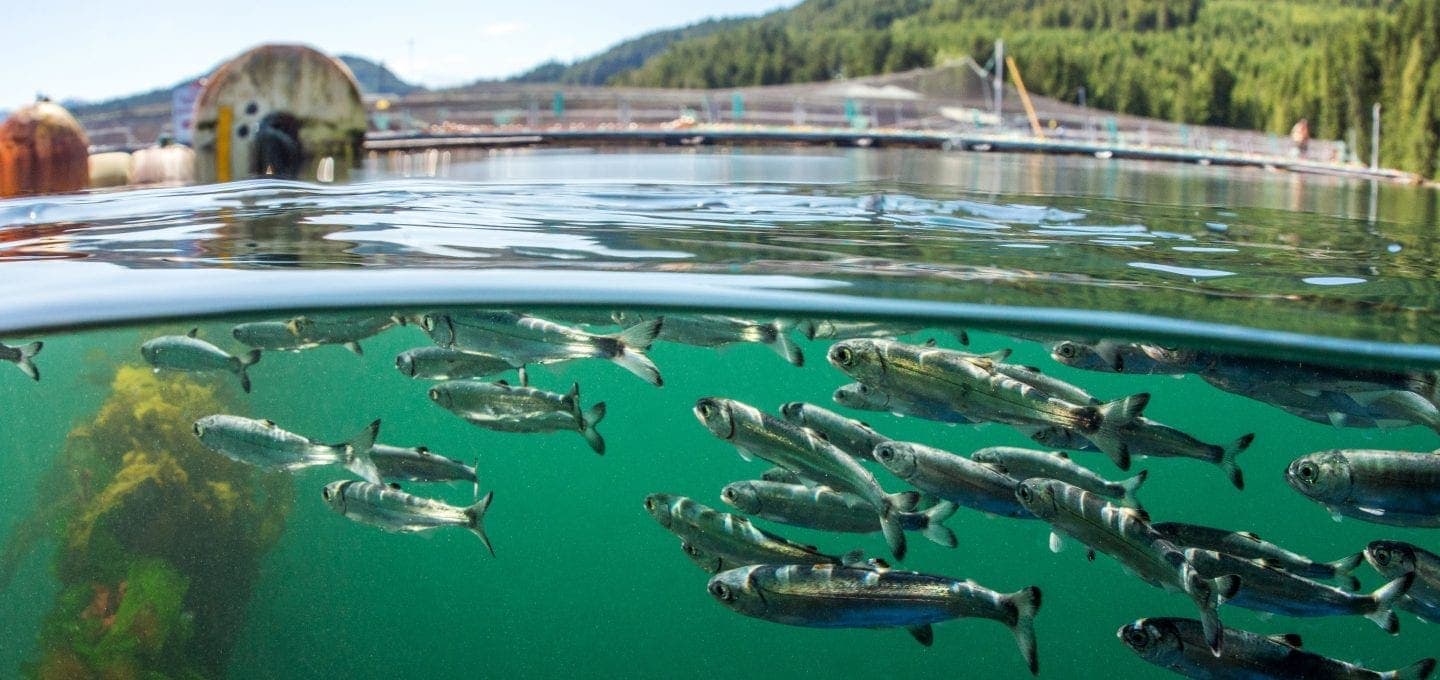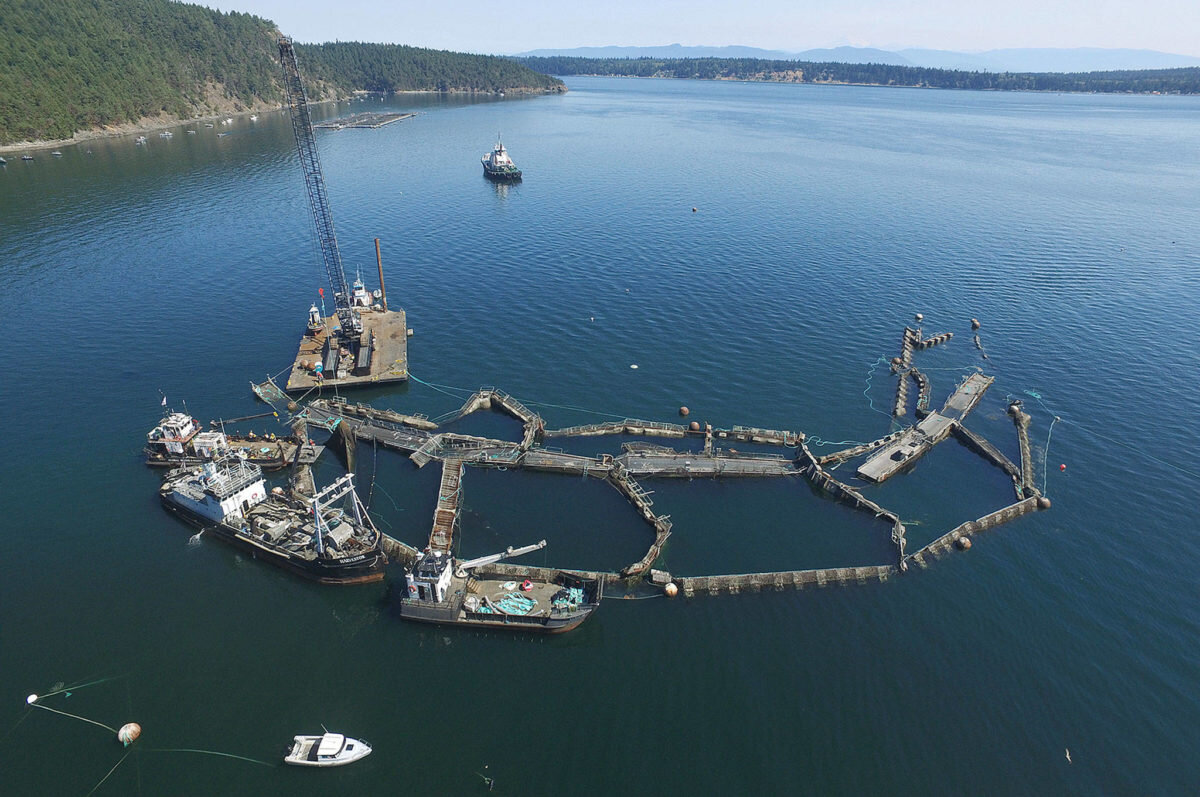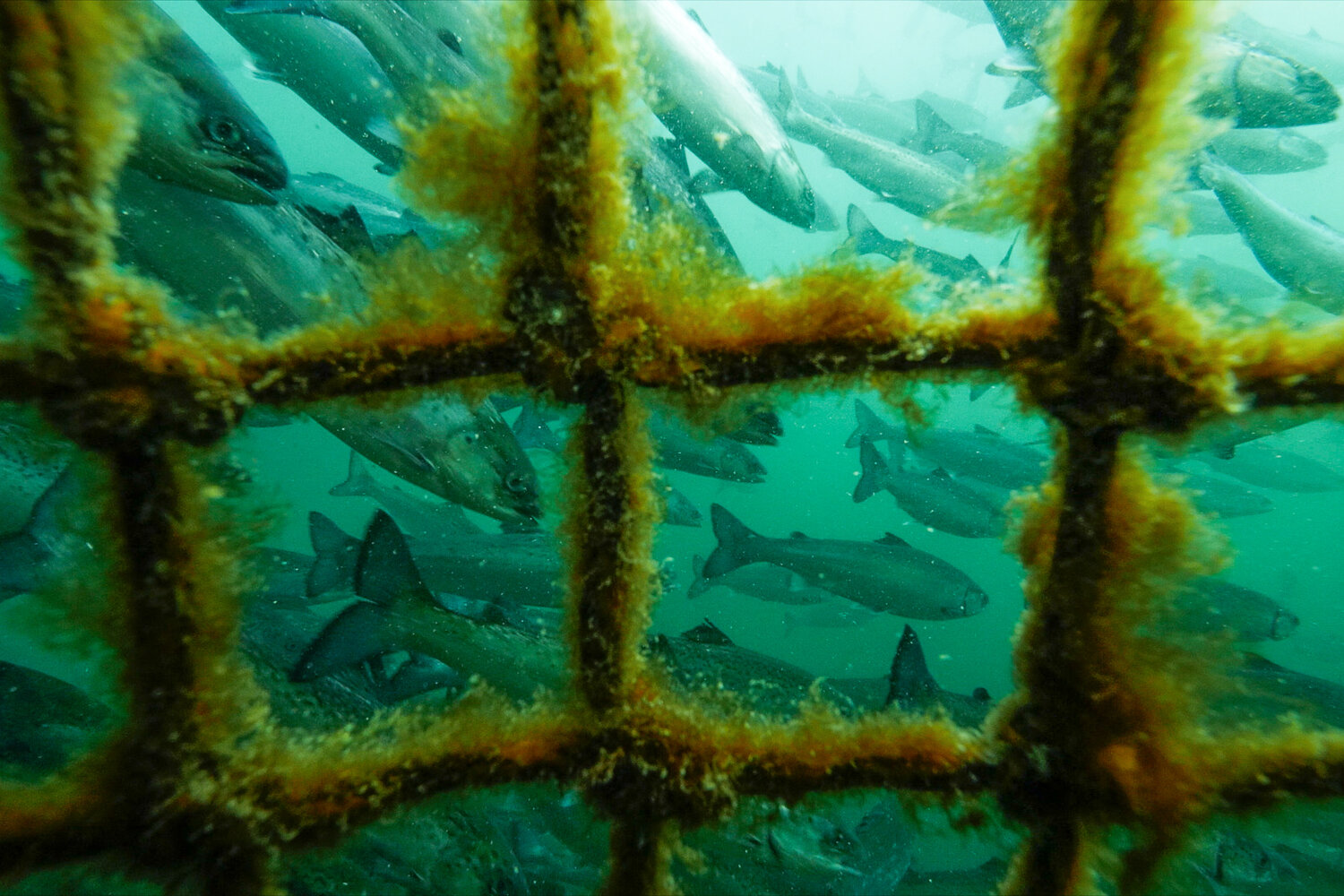
A new analysis released by NOAA Fisheries confirms commercial marine net pens operating in Puget Sound are harming threatened and endangered salmon, steelhead, and other protected fish, as well as their critical habitats.
The comprehensive new analysis released in February, called a biological opinion, marks the first-time that federal agencies have ever conducted this type of rigorous formal consultation in the three decades that commercial net pens have operated in Washington waters. The findings represent an important and major shift from the federal agency’s former expert opinion that commercial net pens operating in Puget Sound are unlikely to harm any species protected under the Endangered Species Act.
Under the Endangered Species Act, a biological opinion evaluates the extent of harm a proposed action will have on threatened or endangered species and whether such harm could jeopardize the continued existence of the species. Biological opinions also include conditions for monitoring and reducing harmful impacts to protected species.

In the new biological opinion, NOAA Fisheries concludes that while commercial net pen aquaculture is unlikely to cause jeopardy, or in other words, unlikely to be the single cause of extinction for any ESA-listed population, these operations are adversely affecting several of Puget Sound’s threatened and endangered wild fish species and harming their critical habitats. The imperiled species NOAA found are likely to be harmed by the impacts of commercial net pens, include Chinook salmon, steelhead, Hood canal summer-run chum salmon, yelloweye rockfish, and bocaccio rockfish.
The analysis found this harm (that the Endangered Species Act refers to as ‘take’) is reasonably and likely to occur through a variety of mechanisms, including but not limited to:
This acknowledgement of harm from the highest level of government is significant, particularly considering one of NOAA’s objectives is to work with the industry to promote and expand aquaculture nationwide. Even through this conservative lens, the agency’s analysis clearly acknowledges the various mechanisms in which Puget Sound’s commercial net pens risk and harm Chinook, steelhead, and other threatened and endangered species and the habitats they depend on.
The net pen aquaculture industry, including Cooke Aquaculture, has emphatically celebrated this report to members of the press and on industry news sites in an attempt to downplay the findings that their operations are harming the very species the public, local governments, and Tribal Nations are working tirelessly to protect and restore.
“The fact that this industry is celebrating their operations won’t cause the immediate extinction of our threatened and endangered species, but rather will only continue to contribute to their decline is an unacceptably low bar.”
Emma Helverson, Executive Director, Wild Fish Conservancy

The new biological opinion investigating Puget Sound net pens is the direct result of a decade of legal challenges by Our Sound, Our Salmon organizer Wild Fish Conservancy against NOAA Fisheries and the Environmental Protection Agency (EPA) for failing to comply with the Endangered Species Act in their assessment of the impacts commercial net pens pose to protected species and their ecosystems. Prior to these legal actions, NOAA and the EPA firmly held that net pens were unlikely to harm any ESA-listed species and therefore comprehensive review of the potential effects through a biological opinion had never occurred.
Under the Endangered Species Act, federal agencies are required to go back and ‘reinitiate consultation’ and prepare a new biological opinion in certain cases, such as when new information that previously had not been considered reveals effects of the action that may affect listed species or their critical habitat.
Between 2008 and 2018, Wild Fish Conservancy argued in two separate lawsuits that NOAA and the EPA were required to reinitiate formal consultation and conduct the first comprehensive biological opinion due to the growing scientific record of the potential harm net pens pose, and in response to major pathogen outbreak and escape events that occurred in Puget Sound net pen facilities over that time.
In 2010, a federal Court ruled that NOAA and the EPA had failed to use the best available science when making their decision and ordered the agencies to go back and reconsider whether a biological opinion is prudent. After a brief consultation, NOAA and EPA reported back to the Court that they had determined once again that this formal consultation was unnecessary.
Shortly after this decision, a massive viral outbreak occurred in Atlantic salmon net pens off the coast of Bainbridge Island in 2012 that spread to all three facilities in Rich Passage, persisting for over a month during a time when juvenile wild salmon were out-migrating through Puget Sound and killing over 1 million pounds of farmed Atlantic salmon.
Wild Fish Conservancy again challenged the agencies’ decision to avoid a biological opinion in 2015, a lawsuit that was ongoing when a net pen imploded in the Cypress Island Marine Reserve in August 2017. The collapse released over 260,000 nonnative farmed Atlantic salmon into Puget Sound, fish now known to be infected with an exotic virus imported by the industry and amplified in their net pens undetected by regulators.
Finally in 2018, on the eve of Court proceedings and after a federal Court rejected the agencies’ efforts to dismiss the 2015 lawsuit, NOAA and EPA announced they had entered into formal consultation under the Endangered Species Act. The result of that formal consultation is the new biological opinion released in February 2022.
NOAA’s acknowledgement of the harm commercial net pens pose is a major step forward, however significant concerns remain over how federal regulators intend to minimize that harm or ‘take’ they report is reasonable and likely to occur. The biological opinion includes a section on ‘Reasonable and Prudent Measures’, however this mitigation relies entirely on NOAA and the EPA reviewing monitoring data and reports the commercial net pen industry is already required to submit to Washington state agencies as part of their existing permits.
In short, the primary strategy for minimizing or eliminating harm to our most threatened or endangered fish populations depends directly on the commercial net pen industry self-monitoring and self-reporting their own violations. This is particularly concerning given Puget Sound’s current and only commercial net pen operator Cooke Aquaculture has demonstrated a pattern and practice of violating state and federal law, both in Puget Sound and around the world. While leasing public waters in Washington, Cooke Aquaculture has violated the terms of their permits, leases, and was held accountable for $2.75 million in Clean Water Act violations (including failure to accurately report.)
It is imperative that federal and state agencies work together to address this failed regulatory approach that is unlikely to prevent catastrophic events before the occur and will only continue to put threatened and endangered wild salmon, steelhead, tribal treaty rights, and the public’s interest at risk.